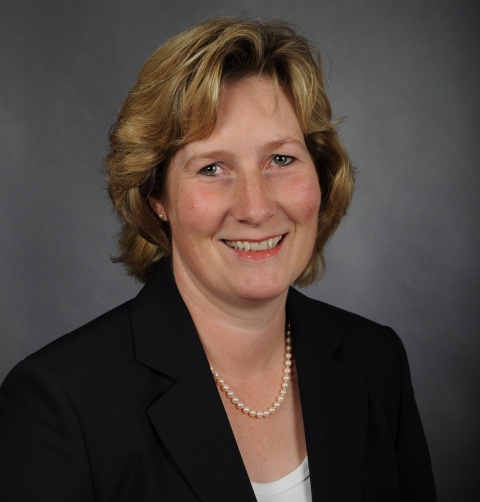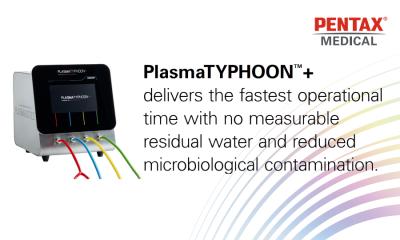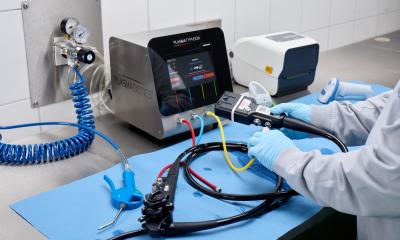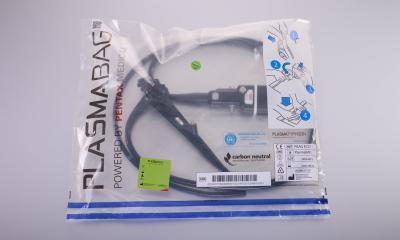Article • Education
The nurse’s role in endoscopic procedures
Hygiene is still a leading topic in endoscopy, and education remains crucial in Europe, according to Ulrike Beilenhoff, scientific secretary of the European Society of Gastroenterology and Endoscopy Nurses and Associates (ESGENA). The two subjects took centre stage during the 21st ESGENA Conference, held during UEG Week in Barcelona this October.
Report: Mélisande Rouger

With around 600 participants, lectures, posters, hands-on training workshops and industry symposia, all stressing the importance of multidisciplinary cooperation and all with good feedback, Ulrike Beilenhoff, scientific secretary of the European Society of Gastroenterology and Endoscopy Nurses and Associates (ESGENA) was pleased with the three-day event. ‘The Spanish Society of Endoscopy Nurses and Associates (AEEED) and Spanish Society of Digestive Disease Nurses (AEEPD) hosted the event – we have an excellent relationship with these two organisations,’ she said.
Highlights
Hygiene, advanced roles and education in different countries were among the most discussed aspects. ‘The session on liver transplantation was also very important, because the endoscopy team handles complications if something goes wrong following surgery. In endoscopy, nurses have a very close relationship with the endoscopist.’
Leading topics
Studies have shown that, to carry out these examinations, nurses are at least as good as doctors
Ulrike Beilenhoff
‘Hygiene has been a big issue since the early 2000s,’ Beilenhoff points out, referring to the increased rate of multidrug resistant infections internationally. ‘In the last three or four years a number of these infections have been reported in endoscopy. Examinations are more invasive, and there’s a potential higher risk of infection. Infections highlight the important impact of staff training, appropriate reprocessing and quality assurance. Nurses’ advanced role is also a major topic. Nurses already fulfil advanced roles in nutrition, functional tests and caring for special patient groups e.g. IBD patients. Only five European countries allow nurses to perform colonoscopy screening: the UK, Ireland, Denmark, Sweden and the Netherlands. Due to different national health systems and national laws, other European countries forbid this at the moment.’
‘However, studies have shown that, to carry out these examinations, nurses are at least as good as doctors. In the UK, nursing and medical endoscopists have the same education. In Denmark, the Netherlands and Sweden, nurses receive a formal, officially recognised training to perform endoscopy examinations.’
Endoscopy training for nurses
‘After basic nurse training, which lasts three years, nurses should do specialist endoscopy training. In many European countries such as the UK, Ireland, Sweden, Italy and France, specialist nurses’ education in endoscopy or gastroenterology is established at university level, as part of a bachelor or masters’ program. In other countries, higher education institutions offer specialist training in endoscopy. A pretty current model across Europe is for nurses to receive gastroenterology and endoscopy education for one year, while they are working in parallel. This is not the case in Germany, where specialist endoscopy education for nurses stretches over two years.’
Trends in Europe
‘There is a clear trend towards university training, although nurses still train at school for basic and specialised education in many countries. But the trend is for countries to switch to university training. Additional training, for instance in hygiene or sedation, is delivered on the job.’
New endoscopy techniques with clinical impact
‘We now carry out a lot of procedures that replace surgery. Minimally invasive treatments have multiplied over the years. The endoscopist now does a lot of advanced endoscopic procedures, for instance tumour resection in the gastrointestinal tract, if the tumour is inside the lumen. Since nurses play an active role during a procedure,’ Bellenhoff continued, ‘new developments also influence their daily work, because deeper knowledge and new training skills are necessary.’
Challenges
‘We have two main tasks in endoscopy nursing: assisting the endoscopist during the procedure and specialised patient care before, during and after the procedure. In Germany and some other European countries, nurses are specially trained to administrate sedation of the patient. For sedation, you need to have a certain amount of experience to handle the medications, and you need to be aware of all resuscitation techniques, so you need special training. When assisting the endoscopist, you need a lot of medical knowledge because you look at the screen or at an X-ray study; you manipulate endoscopic accessories and play an active part during the procedure. So you have to understand what you are doing together. These are two totally different but fascinating tasks.’
Profile:
From 1989, nurse Ulrike Beilenhoff has specialised in endoscopy since 1989 and was head nurse in an endoscopy department for more than 15 years. She now teaches endoscopy during nurse training in Germany. A founding member of ESGENA, Beilenhoff has served on its governing board for several years, and currently she is the organisation’s scientific secretary, President of the Germany society of Endoscopy Nurses and editor-in-chief of the German journal Endo-Praxis.
08.02.2018





